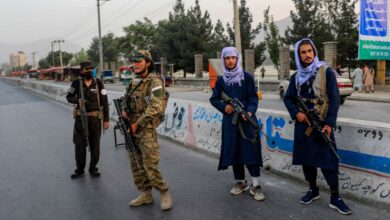Cambodia court upholds life sentence for last Khmer Rouge leader

Ho Chi Minh City, Vietnam, Sep 22 (EFE).- The Extraordinary Chambers in the Courts of Cambodia, which judge the atrocities committed by the Khmer Rouge, ended their 16 years of activity Thursday in Phnom Penh after upholding a genocide life sentence against Khieu Samphan, the regime’s last living leader.
The former head of state of Cambodia under the Khmer Rouge, dressed in white, wearing a mask and sitting in a wheelchair, listened as the judge read one by one the crimes for which he was convicted in 2018 and maintained the life sentence for genocide of Vietnamese minorities.
The legal team of Khieu Samphan, 91, had alleged procedural errors that were dismissed by the court, definitively closing the activity of this special court, created in 1997 and active since 2006 with the conviction of only three of the top leaders of the Khmer Rouge.
Samphan, born in 1931 into a wealthy family and a doctorate in Economic Sciences in Paris, planned the Khmer Rouge’s agrarian policy and was at one point its intellectual voice, spokesperson and official representative, loyally following the head of the organization.
He was inaugurated as president of the Democratic Republic of Kampuchea in 1976, the year after the Khmer Rouge seized power by force.
After losing the capital, Phnom Penh, to the Vietnamese Army in 1979, he became the visible head of the so-called Government of Democratic Kampuchea in Beijing, until he nominally replaced Pol Pot in 1985.
The other two convicted are Kaing Guek Eav, or Duch, director of the main interrogation and execution center during the regime (1975-1979), who died in 2020, and Nuon Chea, who died in 2018.
Pol Pot, the leader of this regime that killed between 1.7 and 2.2 million Cambodians through mass murder and famine, died in 1998 and could not be tried.
With the reaffirmation of the conviction of Khieu Samphan came the end of a 16-year process, criticized for its slowness, having led to the conviction of only three regime leaders and high cost – more than $ 300 million – financed largely by international donations.
The court will maintain some activity for the next three years for minor functions such as file management and other internal work, but no more trials will be held. EFE
esj/lds





